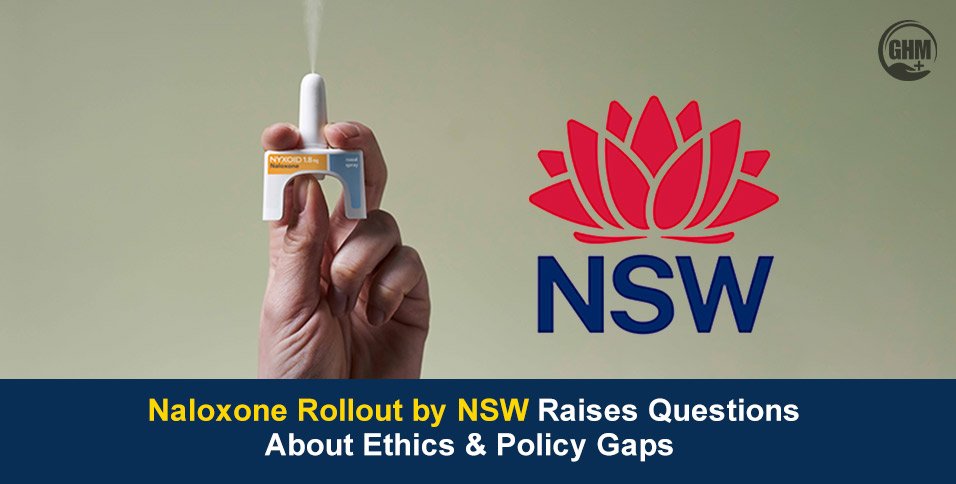The upcoming naloxone rollout by NSW Government (New South Wales) will mark a turning point in Australia’s response to the growing opioid crisis. Soon, pubs, clubs, and music venues across the state will begin carrying the opioid-reversal spray as part of their first aid kits.
While the initiative is expected to save lives, the policy gaps and ethical challenges that could complicate how this program works once it takes effect.
What is Naloxone?
- Naloxone is a fast-acting medication designed to reverse the effects of an opioid overdose. It works by quickly binding to the same brain receptors as opioids, such as heroin, morphine, or fentanyl, and blocking their effects, restoring normal breathing within minutes.
- Commonly available as a nasal spray (brand named Nyxoid) or injectable form, naloxone is safe, easy to use, and poses no harm if given to someone who isn’t experiencing an opioid overdose.
- It has become a critical tool in harm reduction programs worldwide, empowering both healthcare professionals and community members to act during emergencies.
- However, its effects last only 30–90 minutes, so emergency medical help is still essential after use.
A Bold Move Meets Unclear Boundaries
The naloxone rollout by NSW aims to empower hospitality workers to act in emergencies, saving lives before paramedics arrive.
Yet questions remain:
Who is responsible for administering it?
What legal protections exist if something goes wrong?
Dr Olivia Matthews, a Sydney-based public health lawyer, notes, “The intent is noble, but without clear legal frameworks, venue staff could face uncertainty about liability and consent.”
Fine Line Between Safety and Liability
Even though naloxone is considered safe to use, venue owners might likely worry about being held accountable if a rescue attempt fails or delays occur.
The naloxone rollout by NSW does not yet specify standardised training across all participating sites. NSW Health provides voluntary guidance, leaving implementation uneven across the state.
Consent & Ethical Decision-Making
Another ethical concern tied to the naloxone rollout is the issue of consent. In overdose situations, patients are often unconscious or disoriented. While emergency laws permit lifesaving interventions, hospitality workers are not medical professionals.
There must be clearer communication to protect both responders and patients.
Uneven Access Across Communities
Despite the promise of the naloxone rollout by NSW, access remains uneven. While urban nightlife venues are quick to adopt the program, regional and smaller-town establishments are left behind.
Limited awareness, resource constraints, and stigma around drug use contribute to slower uptake.
Public Perception
This rollout by NSW also faces resistance from sections of the public who see it as enabling drug use. Naloxone is not a “safety net” for risky behaviour but a harm reduction tool. It is similar to having defibrillators or first-aid kits.
Regulatory Grey Areas
- Currently, there is no legislation mandating that all licensed venues must carry naloxone, leaving participation voluntary.
- However, without an enforceable policy, this naloxone rollout might fail to achieve consistent results.
Balancing Public Health & Practicality
The naloxone rollout by NSW highlights a broader debate of whether public venues should become frontline responders to the opioid crisis. For many, it’s an ethical tightrope between safety and responsibility.
Venues, already burdened by post-pandemic regulations, face practical concerns like costs, training time, and emotional toll on staff. Yet, with synthetic opioids like nitazenes spreading, inaction isn’t an option.
The Way Forward
The government must introduce standardised training, legal clarity, and rural outreach to make the NSW rollout effective. Integrating naloxone education into hospitality certifications could help normalise its use while ensuring competence.
Additionally, collecting and publishing data, such as the number of overdose reversals and response times, will also help measure success and guide future policy updates.
Conclusion
The naloxone rollout by NSW is a groundbreaking step in public health, but without structured policies and ethical safeguards, it risks leaving too many grey areas. Saving lives requires not just access to medicine, but also clarity, training, and compassion.
In an era of increasingly potent synthetic opioids, the challenge isn’t just distribution, it’s responsibility. This rollout can succeed only when every stakeholder, from policymakers to bartenders, knows where their duty begins and ends.













